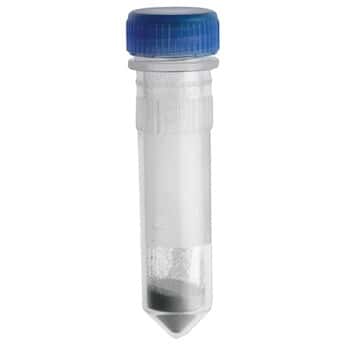Benchmark Scientific Bulk Homogenizer Beads and Tubes - D1131-01
Benchmark Scientific Bulk Homogenizer Beads and Tubes are offered in a variety of options to meet a wide range of samples. The efficiency of bead homogenization relies on several factors, including the material and size of the beads.
- Silica (glass), TriplePure™ Zirconium and Steel
- Range of sizes to meet a variety of sample needs
- Ready to use
- Empty tubes also available
Silica (glass) homogenizer beads are ready to use – acid washed and heat treated to remove contaminants and render them nuclease and protease free. 0.1 mm diameter beads are the best choice for homogenization of gram positive and negative bacteria. 0.5 mm diameter beads are used to homogenize bacteria, fungi, spores, molds and small yeasts. 1.0 mm diameter beads can be used to homogenize fungi, spores, algae and larger yeasts. Triple-Pure™ Zirconium Homogenizer beads are ready to use and certified nuclease and protease free. 6mm satellites are acid washed and heat treated, but not certified.)
Stainless steel homogenizer beads are available in 2.8 mm and 5 mm diameter sizes. Steel beads are much denser than zirconium and are useful for homogenization of harder samples as well as dry grinding. Beads are alcohol washed and heat treated to remove contaminants and render them nuclease free. Garnet shard are available for samples that need to be torn and can be used with the 6 mm zirconiu satellites.
Different sizes of beads are useful for the following sample types:
- 0.1 mm diameter beads: gram positive and negative bacteria.
- 0.5 mm diameter beads: bacteria, fungi, spores, molds and small yeasts
- 1.0 mm diameter beads: fungi, spores, algae and larger yeasts
- 1.5 mm diameter beads: soft tissues such as adipose and liver, small insects
- 3 mm diameter beads: harder tissues such as heart and lung, tumor samples
- 6 mm diameter satellite: very hard tissues such as seeds, dry grinding, hair
Convenient prefilled tubes are also available.
You've got questions, we've got answers.
Reach out and let's see what we can do together.
